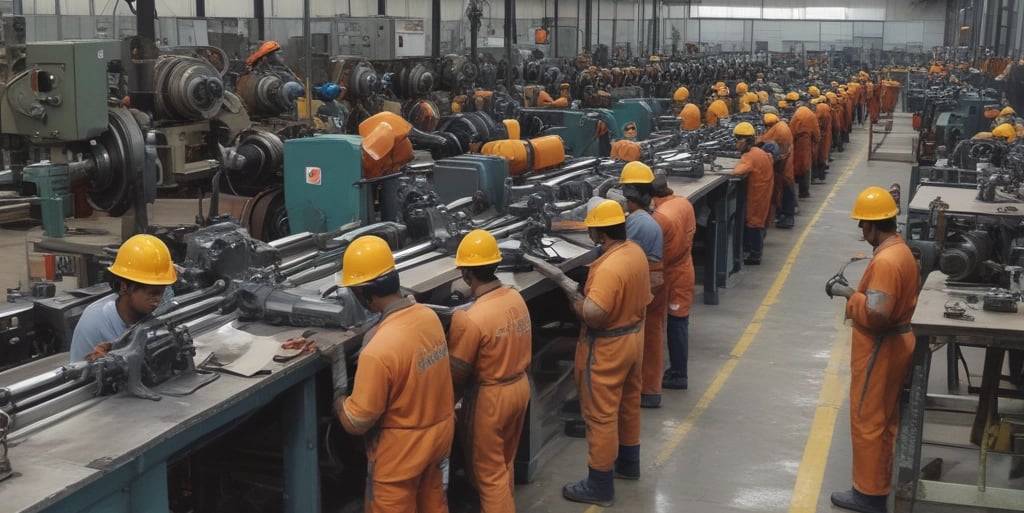Our Safety Policy
1. Purpose
Cardan Craft Company is committed to ensuring the health, safety, and well-being of all employees, contractors, visitors, and stakeholders involved in our operations. This policy outlines our dedication to maintaining a safe working environment during the manufacturing, storage, and export of Cardan Shafts and Propeller Shafts, in compliance with Indian statutory requirements and international safety standards.
2. Scope
This policy applies to all employees, temporary workers, contractors, and visitors at all facilities operated by Cardan Craft Company in India, including production units, warehouses, and offices.
3. Management Commitment
The management of Cardan Craft Company pledges to:
Prioritize safety as a core value equal to quality and productivity.
Provide adequate resources (training, equipment, and systems) to implement this policy.
Ensure compliance with the Factories Act, 1948, Occupational Safety, Health, and Working Conditions Code, 2020, and other applicable laws.
Foster a culture of shared responsibility where every individual actively contributes to workplace safety.
4. Safety Objectives
Achieve zero accidents, injuries, or occupational illnesses.
Mitigate risks associated with machinery operation, material handling, welding, and heavy lifting.
Ensure 100% compliance with PPE (Personal Protective Equipment) requirements.
Conduct regular safety audits and hazard assessments.
Promote safety awareness through continuous training and communication.
5. Safety Procedures
A. Workplace Safety
Machinery and Equipment Safety
All machinery (lathes, CNC machines, welding units) must be inspected, maintained, and guarded as per manufacturer guidelines.
Lockout-Tagout (LOTO) procedures must be followed during maintenance or repairs.
Material Handling
Use mechanical aids (cranes, forklifts) for lifting heavy shafts; manual handling must follow ergonomic guidelines.
Secure loads during transportation within the facility and for export.
PPE Requirements
Mandatory PPE: Safety helmets, gloves, steel-toe boots, safety glasses, and hearing protection in high-noise areas.
Additional PPE (welding masks, aprons) for specific tasks.
Housekeeping
Keep work areas clean, dry, and free of obstructions.
Store raw materials and finished products safely to prevent tripping hazards.
B. Fire and Emergency Safety
Fire extinguishers, alarms, and emergency exits must be accessible and regularly inspected.
Conduct bi-annual fire drills and evacuation training.
First-aid kits and trained personnel available on all shifts.
C. Chemical Safety
Safe storage and labeling of lubricants, solvents, and welding gases.
Provide Safety Data Sheets (SDS) for all hazardous chemicals.
6. Training and Awareness
Induction Training: All new hires and contractors must complete safety orientation.
Job-Specific Training: Operators, welders, and technicians receive training on machinery, PPE, and hazard control.
Refresher Programs: Annual workshops on safety protocols and emergency response.
7. Monitoring and Reporting
Safety Audits: Monthly inspections by the Safety Committee to identify risks.
Incident Reporting: All accidents, near-misses, or hazards must be reported immediately to supervisors.
Corrective Actions: Root cause analysis and corrective measures for all incidents.
8. Compliance and Accountability
Violations of safety rules will result in disciplinary action, up to termination.
Employees are encouraged to report unsafe conditions without fear of retaliation.
9. Continuous Improvement
Review this policy annually or after significant operational changes.
Benchmark against global standards (ISO 45001) to enhance safety performance.


Connect
Your trusted partner in industrial machinery solutions.
Quality
Support
cardancraftcompany@gmail.com
+91 87009 19393
© 2025. All rights reserved.
